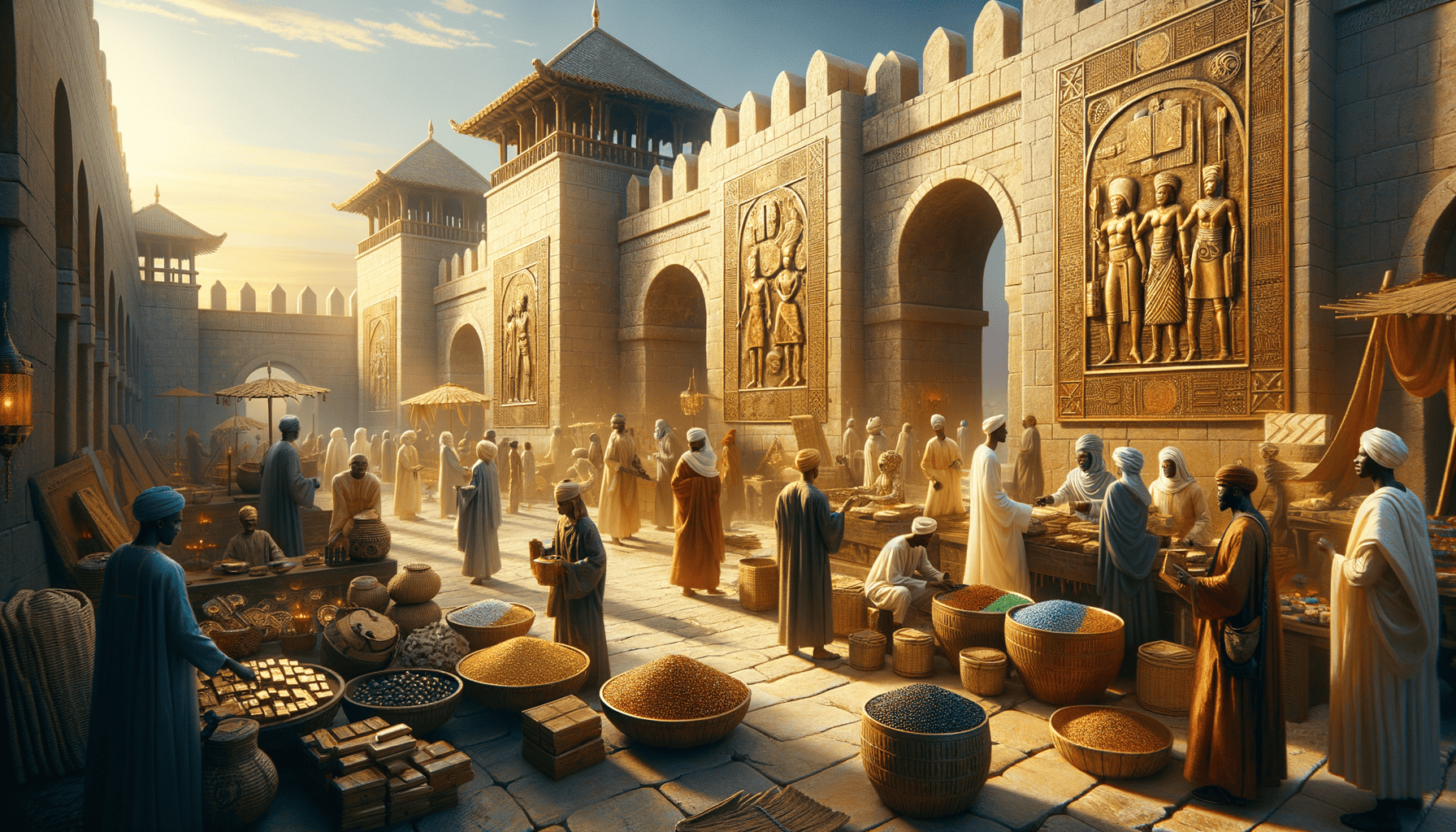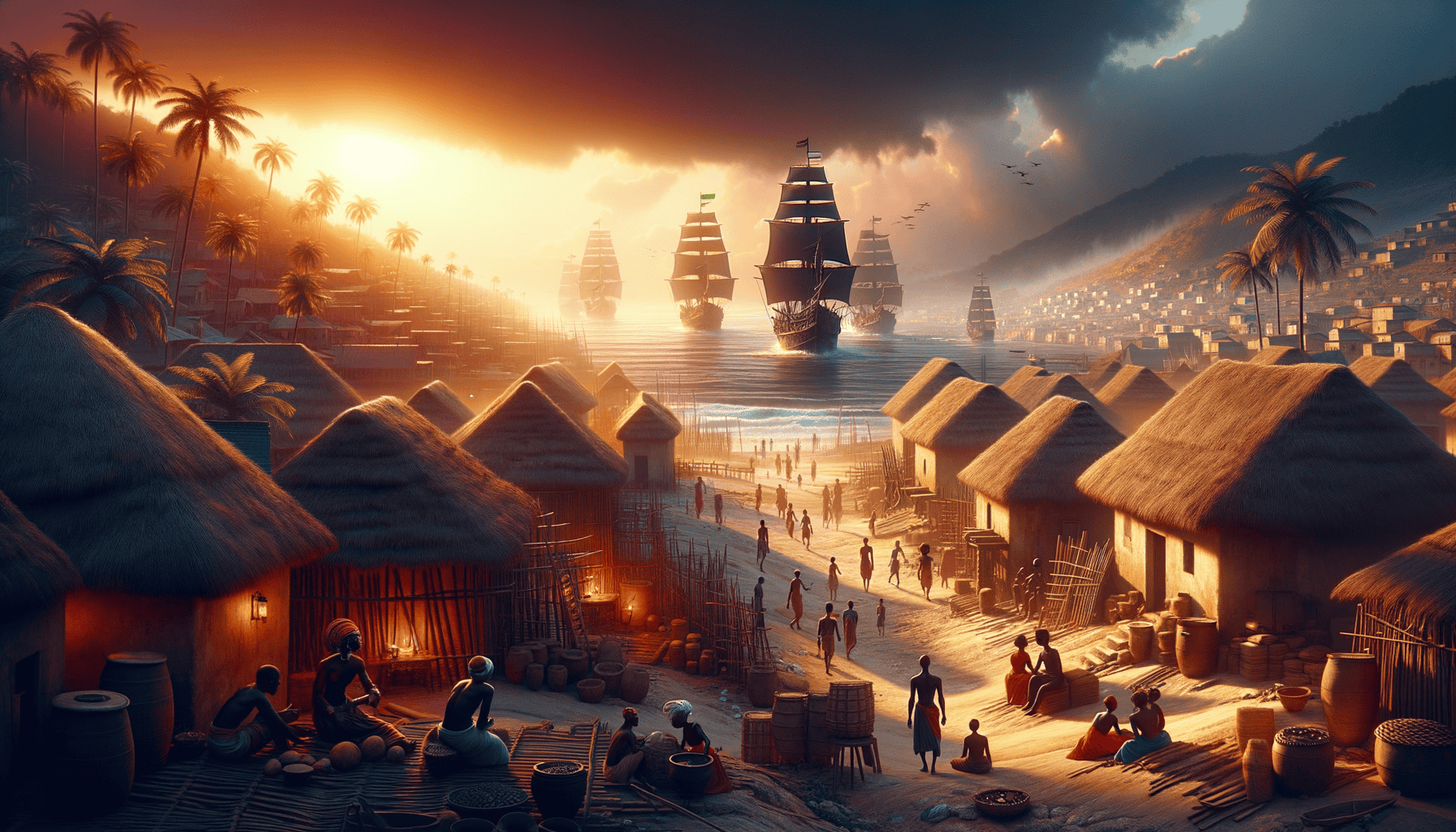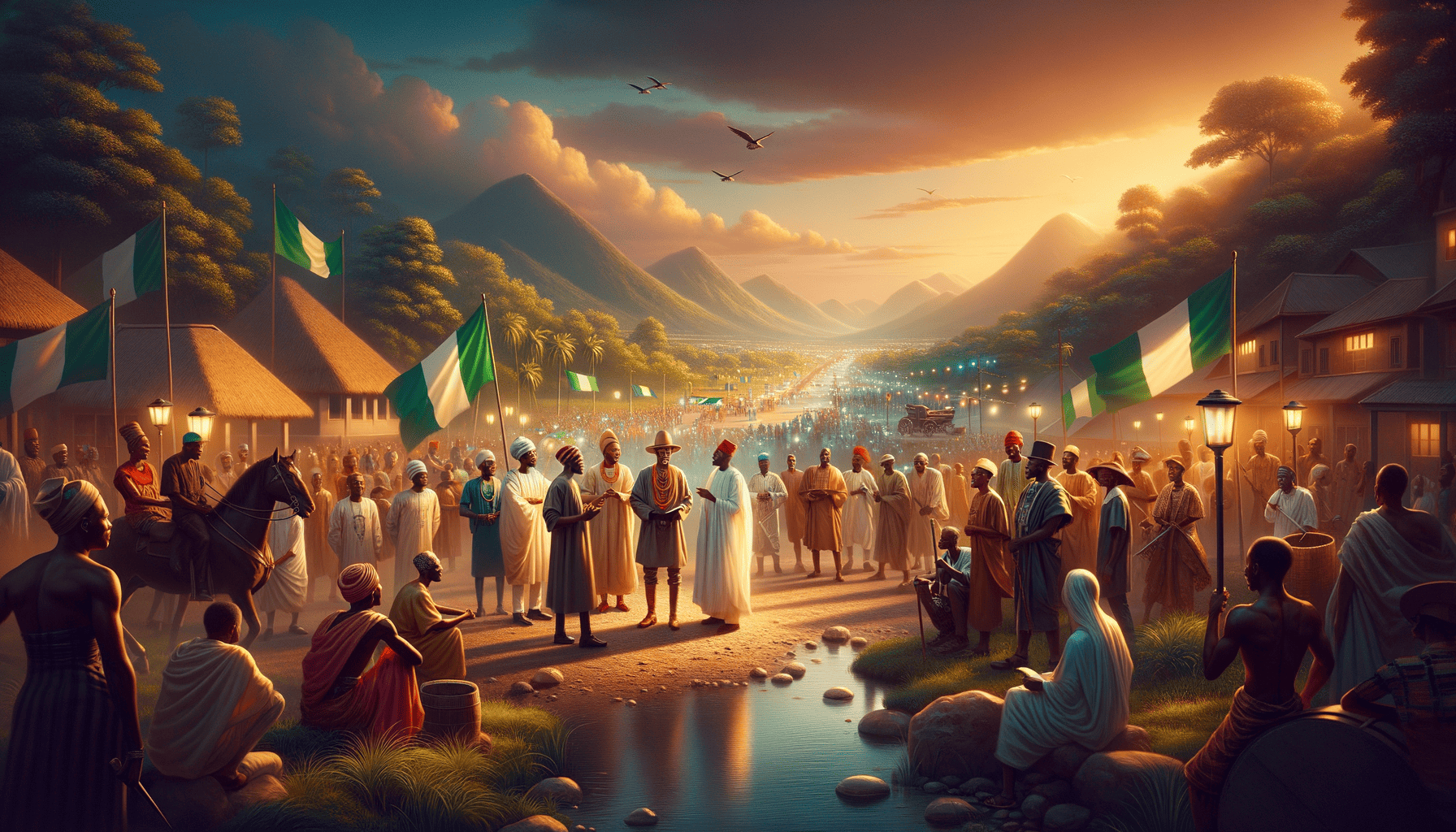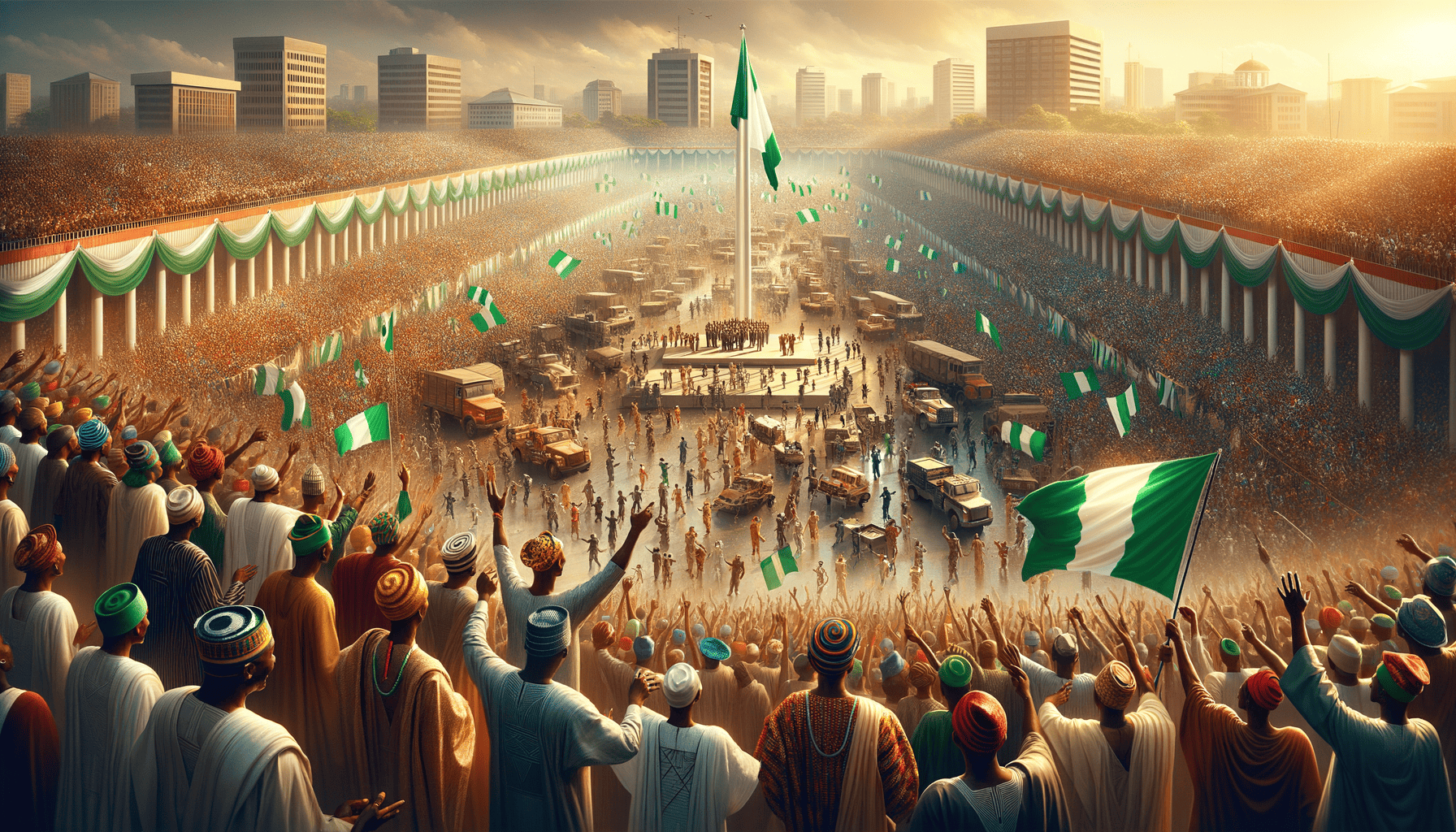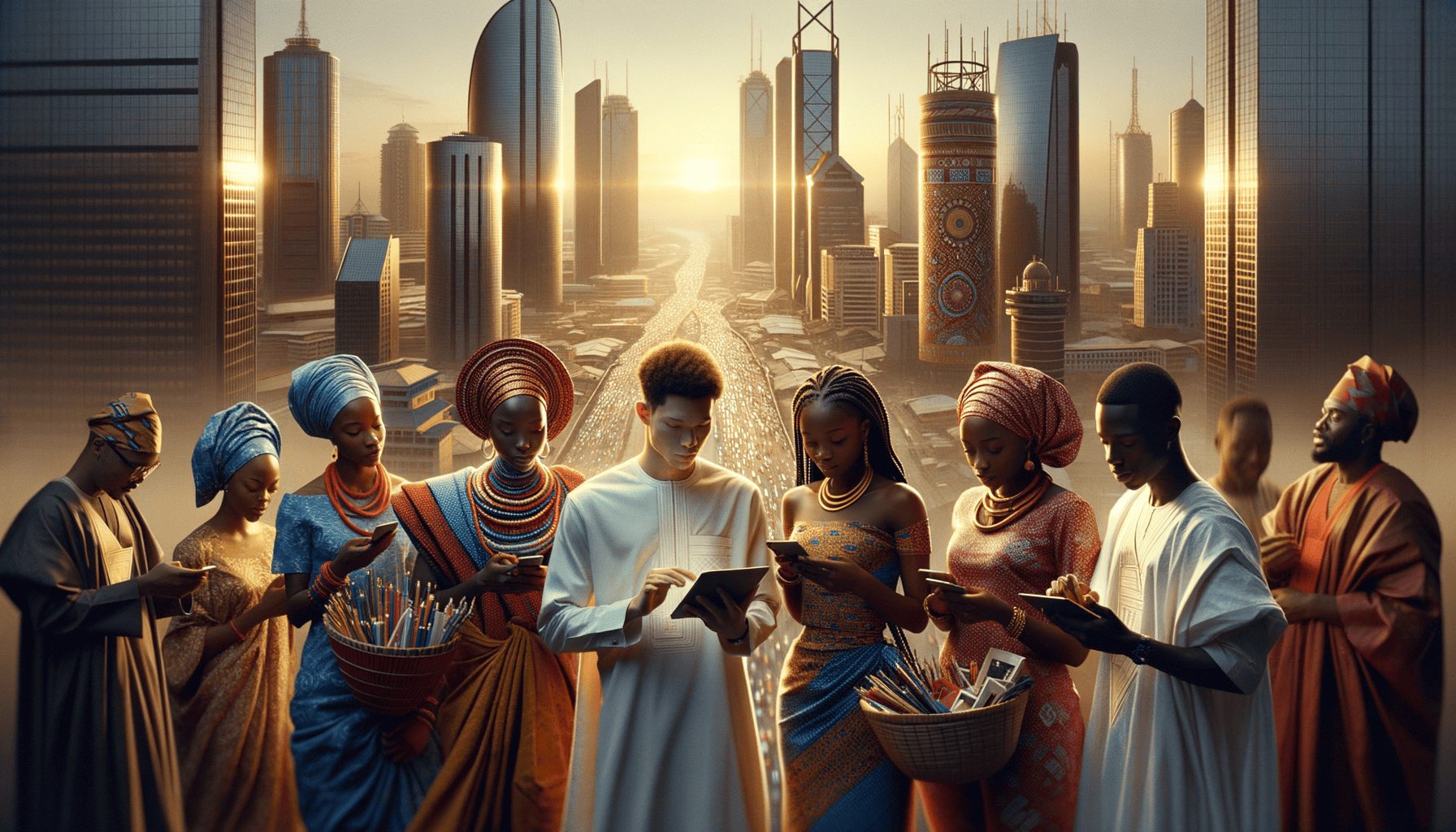Ancient Wonders of the Nok
Long, long ago, in a beautiful land called Nigeria, there lived clever people known as the Nok. They made their home in a special place where green hills rolled like waves and red earth sparkled under the warm African sun.
Little Amina skipped along the dusty path, following her grandmother to their family’s garden. “Nana,” she asked, “who were the first people to live in our land?”
Nana smiled warmly and sat down under a shady tree. “Come, little one. Let me tell you about our ancestors, the amazing Nok people.”
“The Nok were very smart,” Nana explained. “They knew how to make things from iron, just like we make pots and pans today. But their most special skill was making beautiful faces from clay.”
“Each face they made told a story, just like the pictures in your storybooks. Some faces wore fancy hats, showing they were important people. Others had big eyes that seemed to watch over our land.”
Amina’s eyes grew wide. “Did they make toys too, Nana?”
“Yes, dear one! They made tiny animals and people from clay. Children just like you would play with them.”
Life in Ancient Nigeria
The Nok people lived in villages with houses made of mud and straw. They grew yams and other food in their gardens. They were good farmers who knew when to plant their crops by watching the sun and stars. ⭐
• Clay statues with special faces
• Tools made from iron
• Pretty beads and jewelry
• Farming tools
• Clay pots for cooking
“But Nana,” Amina wondered, touching a small clay pot, “how do we know all these things about the Nok?”
“Ah!” Nana’s eyes twinkled. “People called archaeologists – they’re like treasure hunters who look for old things – found these special objects buried in the ground. Each thing they found was like a piece of a big puzzle that told us about our past.”
The sun began to set, painting the sky in beautiful oranges and pinks. Amina watched as shadows danced across the red earth, imagining the Nok people working and playing in this same spot so many years ago.
“We must always remember the Nok,” Nana said softly. “They were the first to show how clever and artistic Nigerian people could be. Their story is your story too, little one.”
Amina hugged her grandmother tight. “Tell me more stories about our land, Nana. I want to know everything!”
As stars began to twinkle in the darkening sky, Nana smiled. She knew there were many more wonderful tales to share about their homeland’s rich history.
Kingdoms of Gold and Glory
The sun rose over a bustling marketplace in ancient Benin City. The streets were lined with beautiful bronze statues that shone like gold. People from far away lands came to trade and marvel at the city’s splendor.
Young Osaze watched wide-eyed as traders displayed colorful fabrics, shiny beads, and sweet-smelling spices. “Papa,” he asked, “why do so many people come to our city?”
“Our kingdom is very special,” Papa explained, adjusting his bright wrapper. “We have skilled artists who make beautiful things from bronze and ivory. People come from across the big seas to trade with us.”
The Great Walls of Benin
The city was protected by huge walls that stretched farther than anyone could see. These walls were made of earth and were taller than four grown-ups standing on each other’s shoulders!
“Our walls are longer than four big cities put together! They kept our people safe and showed everyone how strong we were.”
In the palace, the Oba (king) sat on a throne decorated with shiny leopards made of bronze. He wore strings of coral beads and held a special staff that showed he was in charge.
Artists and Traders
The bronze casters worked their magic in special workshops. They made plates that told stories of brave warriors and wise kings. The sound of hammering filled the air as they created masterpieces that would last forever.
• Beautiful bronze art
• Mighty city walls
• Busy marketplaces
• Powerful kings
• Smart traders
“Look, Papa!” Osaze pointed at a group of traders. Some wore turbans and spoke different languages. Others had skin as pale as moonlight.
“Yes, my son. Our kingdom trades with people from many lands. We sell them ivory, pepper, and beautiful art. They bring us copper, coral beads, and cloth.”
Life in the Great Kingdom
Children played in courtyards while their mothers sold yams and fish in the market. Craftsmen taught their children how to make bronze figures and carve ivory. Everyone had a special job to do.
At night, storytellers shared tales of brave warriors and wise queens. The children sat around fires, listening to stories about how their kingdom grew strong and rich. ⭐
“Papa,” Osaze whispered as they walked home through the busy streets, “I want to learn to make bronze figures like the craftsmen.”
Papa smiled proudly. “First, you must learn our history, my son. For in knowing where we come from, we understand better who we are.”
The setting sun made the bronze statues glow like fire. Osaze touched one gently, feeling connected to all the skilled artists who came before him. Their kingdom was truly a place of gold and glory.
A New Wind Blows
The morning was different in Benin City. Strange ships with white sails appeared on the horizon. Little Adanna stood with her grandmother, watching from the marketplace.
“Nne,” Adanna tugged at her grandmother’s wrapper, “who are those people?”
“They are visitors from across the big water,” Grandmother said softly. “They bring new things we’ve never seen before.” Her voice carried a hint of worry.
New Friends or New Problems?
The Europeans brought shiny mirrors, colorful beads, and strange tools. At first, they traded fairly with the Nigerian people. But soon, they wanted more than just trade.
“Remember, little one,” Grandmother whispered, “our ways are precious. We must hold them close to our hearts.”
In the village square, people gathered to look at the new things. Some were excited, but others felt scared. The elders talked in worried voices about changes coming to their land.
Brave Hearts
Many Nigerian leaders tried to protect their people’s way of life. They were brave like lions and wise like owls. They knew they had to be strong to face the new challenges.
• New trade goods arrived
• Different languages were heard
• Strange customs appeared
• New rules were made
• Some old traditions were threatened
“Look how they write with those strange marks,” Adanna said, watching a European trader make notes.
“We have our own ways of keeping stories,” Grandmother reminded her. “Our songs, our dances, our talking drums – they all tell our history.”
Standing Strong
The Nigerian people didn’t give up their culture easily. They kept dancing their dances and telling their stories. They taught their children about their proud history.
At night, families still gathered to share tales of brave ancestors. The talking drums still beat messages across the land. The old ways lived on in their hearts.
Hope for Tomorrow
One evening, as the sun set, Adanna helped her grandmother cook jollof rice. “Will everything change, Nne?” she asked.
“Some things will change, my sweet one,” Grandmother stirred the pot thoughtfully. “But we are like the mighty iroko tree – our roots go deep. We bend with the wind, but we do not break.”
Young people like Adanna learned to live in two worlds. They learned new things from the Europeans but kept their own special traditions too. They were brave and clever, finding ways to keep their culture strong.
“Remember,” Grandmother said, hugging Adanna close, “you carry the strength of all our ancestors in your heart. No wind can blow that away.” ❤️
The sun set over Benin City, painting the sky in beautiful colors. The talking drums echoed in the distance, telling stories of hope and courage. Even as things changed, the spirit of Nigeria stayed strong.
The People Rise Up
The sun rose over Lagos, where young Olayinka watched people gather in the streets. Something big was happening. The year was 1944, and Nigeria was waking up!
“Papa, why are so many people meeting today?” Olayinka asked his father.
“We are tired of others telling us what to do,” Papa explained. “It’s time for Nigeria to rule itself.” His eyes sparkled with hope. ✨
Brave Leaders Step Forward
Special people helped lead the way to freedom. Nnamdi Azikiwe (called Zik) wrote in newspapers about freedom. Herbert Macaulay organized meetings where people talked about their dreams for Nigeria.
“We want to be free to make our own choices,” Zik would say. “Nigeria belongs to Nigerians!”
Olayinka watched as more and more people joined the freedom movement. They sang songs and carried signs. Some even wrote plays and poems about being free!
Working Together
People from all parts of Nigeria came together. The Yoruba, Igbo, Hausa, and many other groups joined hands. They knew they were stronger together.
• They wrote in newspapers
• They held peaceful protests
• They made speeches
• They formed groups
• They sang freedom songs
Peaceful Power
“Look how many people came to listen!” Olayinka pointed at the crowd in the park. Women in colorful wrappers stood next to men in traditional caps. Students carried books and signs.
The leaders taught people to fight for freedom without using violence. They used words, songs, and peaceful meetings instead. This was called “peaceful resistance.” ️
Getting Closer to Freedom
Every day, more people joined the movement. They wanted better schools, better jobs, and the right to make decisions about their own country. The British rulers started to listen.
In 1953, Nigerian leaders went to London to talk about freedom. They worked hard to make plans for running their own country. Everyone was getting excited! ✈️
Dreams of Tomorrow
One evening, Olayinka sat with his family, eating pounded yam and egusi soup. “What will Nigeria be like when we’re free?” he asked.
“It will be wonderful,” Mama smiled. “We’ll build new schools and hospitals. We’ll make our own laws. We’ll show the world how great Nigeria can be!”
Young people like Olayinka learned about democracy and leadership. They studied hard, knowing they would help build the new Nigeria. The whole country buzzed with hope and plans.
“You’re watching history happen,” Papa told Olayinka. “Soon, we will be free to choose our own path.” ️
Almost There
By 1957, everyone knew freedom was coming soon. Nigerian flags started appearing in shops and homes. People practiced singing the new national anthem. The dream was becoming real!
As the sun set over Lagos, Olayinka helped his father paint their house in green and white – Nigeria’s new colors. The whole country was getting ready for a new beginning. Freedom was just around the corner!
Building a New Nation
The morning of October 1, 1960, brought something amazing to Nigeria. The British flag came down, and Nigeria’s green-and-white flag went up!
“We are free!” people shouted in the streets. Everyone was dancing and celebrating. After many years of hard work, Nigeria was now its own country.
First Steps as a Free Country
Little Amina watched the celebration with wide eyes. “Grandma, what happens now?” she asked.
“Now we build our country together,” Grandma smiled, adjusting her colorful headtie. “It’s like building a big house – everyone needs to help!” ️
“Nigeria is like a beautiful garden with many different flowers. Each flower is special, but together they make something wonderful!” – Grandma told Amina
Making Things Work
Nigeria’s new leaders had lots of work to do. They needed to:
• Build more schools
• Fix roads
• Help farmers
• Start new businesses
It wasn’t always easy. Sometimes different groups had different ideas about how things should work. But they tried hard to listen to each other and find ways to work together.
Growing Together
Amina’s father got a job teaching at a new school. “We’re teaching more children than ever before,” he said proudly. “They will help make Nigeria even better!”
All across the country, new things were happening. Farmers grew more food. Workers built new roads. Doctors opened new hospitals. Everyone was helping!
Celebrating Different Cultures
One day, Amina’s class had a special celebration. Each student shared something from their culture – songs, food, or stories. There were Yoruba drums, Hausa caps, and Igbo masks.
“See how rich we are?” her teacher said. “We have so many beautiful traditions to share!”
Facing Challenges
Sometimes things were hard. Some areas needed more help than others. Leaders had to learn how to solve big problems. But people kept working together and helping each other.
“Remember,” Amina’s mom would say, “a tree grows slowly, but it grows stronger every day.”
Looking Forward
As Nigeria grew, more exciting things happened. Nigerian music played on radios around the world. Nigerian athletes won medals. Nigerian writers wrote books that everyone wanted to read.
Young people like Amina studied hard. They wanted to help make their country better. “What will you do to help Nigeria?” Grandma asked.
“I want to be a doctor,” Amina said. “I’ll help make people healthy!” Her grandmother beamed with pride. ⚕️
Dreams Getting Bigger
Every Independence Day, Amina’s family watched the parades and celebrations. The green-and-white flag flew high, reminding everyone how far they had come.
“We’re still growing,” Grandma said, “and there’s so much more we can do together!” ⭐
Dreams of Tomorrow
The sun sparkles over Lagos, Nigeria’s biggest city. Tall buildings reach up to the sky. Cars zoom down busy streets. Children play soccer in colorful jerseys. This is Nigeria today!
A Growing Giant
Little Chioma sits on her grandfather’s lap, watching planes fly overhead. “We’re Africa’s biggest country now,” Grandfather says proudly. “More than 200 million people call Nigeria home!”
“Tell me more about our country, Grandfather!” Chioma asks excitedly.
Nigerian Stars Shine Bright
Nigerian singers fill concert halls worldwide. Movies from “Nollywood” make people laugh and cry. Writers tell stories that win big prizes.
“Our music makes the whole world dance!” Chioma’s sister says, doing a little twirl.
Young Dreams Growing
In schools across Nigeria, children learn new things every day. Some want to be:
• Teachers sharing knowledge
• Scientists making discoveries
• Artists creating beauty
• Business leaders building companies
Working Together
Different groups still live together in Nigeria. They speak different languages and have different traditions. But they work together to make their country better.
From the busy streets of Lagos to quiet villages, people help each other. They share food, stories, and dreams.
Fixing Problems
“Do we still have problems?” Chioma asks her grandfather.
“Yes, little one. Some roads need fixing. Some children need better schools. But we’re working hard to make things better every day.” ️
Green Solutions
Nigeria is thinking about the Earth too. People plant trees and clean up trash. They use solar power to make electricity. Young people lead the way in protecting nature.
“We want clean air and water for everyone,” says Chioma’s teacher. “It’s our job to take care of our home.”
Big Dreams Ahead
Nigerian scientists work in modern labs. They make new medicines and solve big problems. Tech wizards create apps and games. Farmers use smart tools to grow more food.
Young people start their own businesses. They find new ways to help their communities. “Nothing is impossible if we work together,” they say.
Hope for Tomorrow
As the sun sets, Chioma looks at the stars with her grandfather. “What do you see in Nigeria’s future?” she asks.
“I see you, little one. You and all the children. You’ll make Nigeria even better. You’ll solve problems we couldn’t solve. You’ll build things we couldn’t build.” ⭐
Chioma smiles. She knows Nigeria’s story isn’t over. It’s still being written, every day, by millions of hands and hearts working together.
“I’ll help write the next chapter,” she says. “We all will.”
From ancient Nok to modern cities, through kingdoms and changes, Nigeria keeps growing stronger. Its people keep dreaming bigger. And tomorrow’s sun will rise on new adventures, new achievements, and new hopes for this amazing land.


